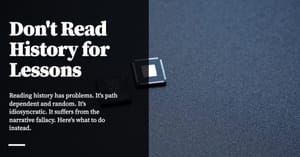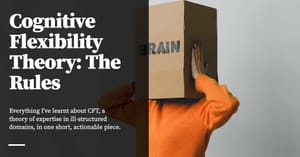John D. Rockefeller Sr. was the richest tycoon of the Gilded Age, at one point valued at two percent of the United States’s GDP. His rise coincided with the creation of the ‘trust’ structure of business — a structure that enabled business practices so unfair and monopolistic the US Government had to create the Sherman antitrust act of 1890 to reign it in.
But the rise of Rockefeller and his ilk also prompted the rise of the muckrakers — reform-minded journalists that exposed business leaders and politicians as corrupt. In fact, the muckrakers were influential in turning the tide of public opinion against the trusts, which led, indirectly, to the creation of the Sherman antitrust act. This was the dawn of the age of the newspaper, and the rise of journalism as a discipline alongside it.
But like most young mediums, journalism, too, had its excesses.
Ida Tarbell was Rockefeller’s muckraker nemesis, and a leading activist of the Progressive Era. She is often credited with pioneering the practice of investigative journalism. But Tarbell stretched the truth about Rockefeller numerous times over the course of her reporting. As Ron Chernow writes in Titan, his history of the Rockefeller family and their business dealings:
Although Tarbell pretended to apply her scalpel to Standard Oil with surgical objectivity, she was never neutral and not only because of her father. Her brother, William Walter Tarbell, had been a leading figure in forming the Pure Oil Company, the most serious domestic challenger to Standard Oil, and his letters to her were laced with anti-Standard venom. Complaining of the trust’s price manipulations in one letter, Will warned her, “Some of those fellows will get killed one of those days.” As Pure Oil’s treasurer in 1902, Will steered legions of Rockefeller enemies to his sister and even vetted her manuscripts. Far from cherishing her neutrality, Tarbell in the end adhered to the advice she had once received from Henry James: “Cherish your contempts.” Amazingly enough, nobody made an issue of Tarbell’s veritable partnership with her brother in exposing his chief competitor.
And later in the book:
However pathbreaking in its time and richly deserving of its accolades, the Tarbell series does not, finally, stand up as an enduring piece of history. The more closely one examines it, the more it seems a superior screed masquerading as sober history. In the end, Tarbell could not conquer her nostalgia for the Titusville of her girlhood, that lost paradise of heroic friends and neighbors who went forth doughtily to do battle with the all-devouring Standard Oil dragon.
I’ve left a lot out of the excerpts above, but anyone reading the history of Ida Tarbell and Standard Oil would be struck by how many of the tricks Tarbell used to stoke anger against Rockefeller still work today.
More importantly, however, those tricks aren't that surprising to us in 2019, more than 100 years after the rise of journalism. Even a casual reader of the news knows to be sceptical when reading a story in the papers, or watching a reported segment on cable news. But at the time of Tarbell’s campaign, public relations hadn’t yet been invented. Society had not developed antibodies against manipulative journalism.
Being Critical in the Age of the Internet
If you read something on the internet today, the odds are good that the writing was produced to capture your attention. This isn’t some profound realisation, of course: many of us are familiar with the idea of an ‘attention economy’. We’re at the end of the second decade of the social Internet; the returns to attention are notoriously lucrative and the competition is steep.
I think the arms race for our attention has led to an arms race in writing. The best online writers are able to make something sound insightful — regardless of whether it’s true, or whether it’s useful.
On one hand, this is the writer’s job. Jason Zweig of the Wall Street Journal likes saying that his goal as a finance writer is to present a small handful of universal investing truths in increasingly novel ways, so readers never know that he’s repeating himself. But at another level, this shift means that online readers have to be increasingly critical when reading essays and blog posts for instrumental reasons.
This isn’t some evil conspiracy. ‘Writers optimising to produce insight porn to grab attention’ sounds nefarious, but it’s really more like ‘writers responding to the incentives of the social internet’ — a simple side effect of the attention economy.
And we shouldn’t be surprised: if Instagram has changed the language of photography, then we should also expect the emergence of Twitter, Medium and Google to change the tenor of writing.
Tricks
It’s interesting to note that I’ve chosen ‘insight’ as a key metric to focus on. I’m ignoring tribalism and novelty here — though both are equally powerful ways to capture attention on the social internet. ‘Hot takes’ that appeal to a group identity perform better than opinion pieces that do not; news that is extreme, or new, or novel does better than news about what is natural and commonplace.
When you’re reading for career reasons, however, you’re seeking insights that can help you perform better or navigate the world better or see things differently or frame things more effectively. Naturally, writing in the self-help or career-advice genres will have to simulate insightfulness in order to keep your attention.
Some ideas sound insightful because they are true. But not all true ideas sound insightful. A true idea that is commonly accepted can sound trite and obvious: we call those clichés. The job of a good writer, then, is to present some truth in a way that doesn’t trip our cliché triggers.
This means that attention seeking in writing usually devolves to the same handful of tricks. I’ve used many of those tricks myself, here at Commonplace. This is a non-exhaustive list.
Use a story. I started this piece with a story. Preferably from a historical period that the reader isn’t familiar with. This establishes that the writer knows something that the reader doesn’t, and is communicating some argument or idea with a basis in history.
I’m not being completely facetious here. Arguments from historical example are often doubly effective: first because they are rooted in reality, and second because they allow the writer to tell a story. Readers love stories — they’re far easier to read than argumentative prose.
Sometimes, writers present obvious truths by way of a story. Morgan Housel is a master of this: in Fat, Happy, And In Over Your Head he tells two stories: the first of the co-working company WeWork and the second of the greatest ski racer in history, Marcel Hirscher. The point of the piece? Housel asserts that you can avoid the pain of loss aversion if you can somehow stop yourself from being greedy. The idea is simple, but Housel’s presentation is novel. Whether his assertion is practicable is another thing entirely.
Repackage obvious truths and sprinkle them over the course of an essay. If a cliché is a truth that is commonly accepted, then an insight is a truth that isn’t widespread. Clichés can thus be repackaged to sound insightful. This is a useful trick because a) clichés are often truths the reader already agrees with, and b) whatever sounds insightful will keep the reader going.
At the top of this essay, I wrote “if Instagram has changed the language of photography, then we should also expect the emergence of Twitter, Medium and Google to change the tenor of writing.”
This is a fairly obvious truth that’s been rewritten to sound more insightful. If you stop to think a bit, you’d quickly realise that writers have always optimised for attention. And if you read a lot online, you’ve probably already noticed this effect in action. It’s just the reference to Instagram that threw you. (Also: look at how I use the phrase ‘optimised for attention’ here, when I could have just as simply said ‘liked to be read’. Certain phrases sound more sophisticated than others — this is yet another technique. More on this in a bit.)
The odds are good, however, that when you read this sentence, you became curious. You kept scrolling because you wanted to see where I would go. This is the trick in action.
David Perell has a famous essay titled Peter Thiel’s Religion. The essay is the length of a small booklet, and is divided into tiny sections, each ending with a packaged insight. A reader going through the piece will keep scrolling, because their brain will go “Oh, that’s interesting! And that’s interesting! And that's also interesting! Ooh, what’s next?”
As a writer, I admire what he’s done. But as a business person, nearly everything that Perell says in the piece about business is subtly wrong — enough to make me treat his essay as entertainment, not education.
What sounds insightful isn't always true or useful.
Use more sophisticated language than necessary. Sometimes simple ideas can be dressed up to seem more legitimate than they really are. The problem is that there are times where this is a reasonable strategy. Economist Russ Roberts once said, of Nassim Nicholas Taleb:
Now, let me take a different book: Fooled by Randomness, by Nassim Taleb. There were two views of that book, which I've mentioned here before. One view was: “There is nothing original in this book. This guy is a fraud. He pretends he has figured out all this stuff.” And I said, “You know, I agree with that.” I didn't learn anything that I didn't know in this book before. I knew that probability is difficult. I knew that risk is a hard thing to wrap your mind around. I understand something about most of the ideas he talked about in the book. So, in some sense, I learned nothing. On the other hand, I learned something incredibly deep. That book really grabbed me by the guts and jerked me around. It forced me to confront some things that I ‘knew’ but didn't really internalise. And I would put that as another category of learning.
Taleb’s strategy of using stories and sophisticated language (along with made-up names) is designed to hammer home a simple set of ideas. Those ideas are difficult to grasp at the explicit level. They have to be made tacit to be useful. So Taleb’s approach is a legitimate use of this trick.
Other times, however, if you strip away the complicated words, the underlying argument appears ridiculous.
Venkatesh Rao is one of the best Internet writers I know. But his pieces are often optimised to sound insightful, as opposed to capturing some operationally useful truth about the world.
In CEOs don’t steer, Rao writes paragraphs like:
The primary CEO function, and the trait the good ones are selected for, is to provide the gyroscopic stability required to keep a company vectored in the chosen direction. They end up in the jobs they do because they counterbalance an organization’s natural tendency towards distraction, ADD and momentum dissipation. A typical company is a wandering, wobbling hive mind, liable to spend all its time chasing distractions if you let it, before dissolving into a bunch of clever tweets about crappy prototypes.
This is a sophisticated sentence. It uses words like ‘gyroscopic stability’ and ‘vectored in the chosen direction’ and ‘clever tweets about crappy prototypes’ — a juxtaposition I enjoy.
But if you strip the essay of its sophisticated language, the core argument Rao makes is ridiculous: most CEOs are unintellectual dummies whose sole purpose is to keep the company on track, rowing in a single direction. This property, Rao asserts, is why so many business books are reducible to single-sentence epithets. It is why consultants cannot often successfully give advice to CEOs. It asserts that CEOs are selected for their ‘non-steering ability’, instead of some other factor. It even explains the existence of the CEO ‘reality distortion field’ (because, Rao asserts, non-steering is more effective in the presence of a vision). It is why companies change CEOs in times of crisis — which Rao argues in such a delightful paragraph that I can’t help but quote:
A “steering” event at the CEO level is a reorientation for the entire company, and for reasons I’ll get to, the best way to accomplish it is to replace the CEO with a new one who is already locked on to a more desirable orientation vector. Like say, Dara Khosrowshahi, who, based on his history, was apparently already locked on to the “don’t be a misogynist asshole” vector that Uber needed before he got the job.
Stripped of all sophisticated language, this argument is easily dismissed as facetious. Each property that Rao pins on ‘not steering’ can be explained by a simpler reason. Rao is simply taking one facet of the CEO experience, and then extrapolating from it into an entire theory of the firm.
Rao’s piece is not ok if your goal is to read for career reasons. But it's ok if your goal is to read for entertainment. It’s ok because Rao’s goal is to attract eyeballs, not create better business leaders. And his writing is so good most people will forgive him for it.
Beware What Sounds Insightful
The takeaway from this piece is that what sounds insightful and what is useful or true are often not the same thing. This aspect of critical reading isn’t emphasised as much as it should be — outside of, perhaps, the social sciences. I think we are all the poorer for it.
A year ago I wrote Writing Doesn’t Make You a Genius. I noticed that people tend to assume good writers are smarter than they actually are. I argued that this was mistaken — that writers sound smarter on paper because the act of writing forces them to clarify their ideas.
But now I have another reason. Writers are often seen as smarter because good writers today are trained to optimise for sounding insightful. This bleeds over into reader perception.
I think that whether a writer sounds smart or a piece sounds sophisticated shouldn’t affect you if your goal is to put things you read to practice. The questions remain the same: “Is this person believable? How likely is this going to be useful? And what’s the cheapest way to find out?”
Originally published , last updated .





